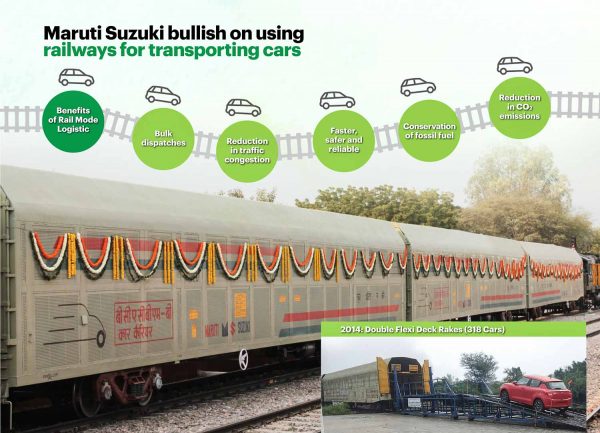In FY 2019-20, over 1.78 lakh Maruti Suzuki cars were dispatched by rail mode, at 15 percent increase over the previous FY, and accounted for about 12 percent of total company sales
In the last six years, Maruti Suzuki India Limited has transported more than 6.7 lakh cars through Indian Railways at CAGR of over 18 percent. The initiative began with double decker flexi-deck rakes in March 2014. Using railways has helped offset nearly 3,000 MT of CO2 emissions resulting from transport of new cars. And, saved 100 million litres of fossil fuel by avoiding 100,000 truck transports on National Highways. Railway transport serves Maruti Suzuki in good stead keeping in mind the huge monthly volume of its shipments.
In the beginning, single deck wagons known as New Modified Goods (NMG) had a capacity to handle 125 cars. Indian Railways’ design arm RDSO (Research Design and Standard’s Organization) designed BCACM double decker rakes with a capacity of 265 cars. The design change resulted in over 100 percent increase in carrying capacity. BCACM design rakes had limitations owing to a fixed middle deck.
RDSO then developed a new design Auto-wagon called BCACBM. BCACBM rakes were more flexible as all models could be accommodated, and capacity increased by 20 percent from 265 cars to 318 cars. In terms of transport, the rakes are designed to be operated at 95 km/hr, speed limit, the highest for any goods train in India. Until now, 27 high capacity BCACM rakes have been inducted for dispatch of Maruti Suzuki cars.
Kenichi Ayukawa, Managing Director & CEO, Maruti Suzuki India said, “Considering the increasing volumes, our team felt the need for large scale logistics flow. We realised, that not only for expansion but also for risk mitigation we have to look beyond road mode logistics.”
Maruti Suzuki has a Automobile Freight Train Operator (AFTO) license, a requirement for private firms to fabricate and operate high speed, high capacity auto-wagon rakes on the Indian Railway’s network. Maruti Suzuki uses five loading terminals (Gurgaon, Farukhnagar, Kathuwas, Patli and Detroj) and 13 destination terminals (Bangalore, Nagpur, Mumbai, Guwahati, Mundra Port, Indore, Kolkata, Chennai, Hyderabad, Ahmedabad, NCR, Siliguri and Agartala). Railway wagon rakes has reduces transportation time by nearly half to the aforementioned states.
Maruti Suzuki operated the largest sales and service network in the country, and sells the most number of cars each year. Its large sales volume depends on timely dispatches, and fulfilment of order-books. This in turn justifies MSIL’s dependence on railway transport.


